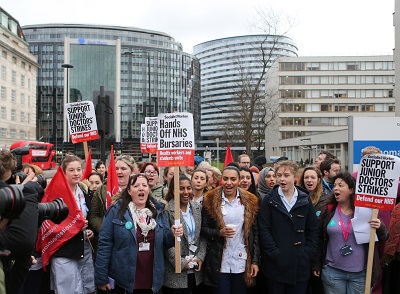London, (Samajweekly) Junior doctors in Britain started a three-day strike in their long-standing dispute with the government over pay and conditions.
Junior doctors — around half of all doctors in the National Health Service (NHS) — took strike action from 7 a.m. local time on Wednesday until Saturday morning. Further strikes, starting from January 3 next year and lasting six days, have also been announced and would be the longest in the history of the NHS.
The NHS warned on its website that, although other doctors will still be working, “the disruption to staffing will cause a significant reduction in elective activity,” leading to the rescheduling of some appointments and procedures.
“On strike days, accident and emergency departments and NHS 111 (digital triage service) are likely to be extremely busy, with longer waiting times than normal,” the NHS added.
Junior doctors’ pay has been cut by more than a quarter since 2008, according to the British Medical Association (BMA). They have been calling for a 35 per cent pay increase amid Britain’s ongoing cost-of-living crisis, Xinhua news agency reported.
In recent talks, doctors were offered an additional three per cent raise on top of the 8.8 per cent pay increase recommended, but the BMA said it would be unevenly spread across doctors’ grades so it would still amount to pay cuts for many doctors this year.
Chancellor of the Exchequer Jeremy Hunt called the strikes “incredibly disappointing” in an interview, adding that Health and Social Care Secretary Victoria Atkins “has said her door is open for constructive discussions”.
Five organisations, including the NHS Confederation and the Patients Association, wrote an open letter, calling on both the government and the BMA to “get back to the negotiating table,” and “find a resolution and bring an end to their dispute”.
Caroline Abrahams from a charity in the UK called Age UK said that the ongoing and upcoming strikes, occurring during “the busiest time of the year in the NHS,” may pose “a much greater potential threat to older people’s health and well-being”.
According to Age UK, more than 1.2 million operations and appointments were cancelled throughout 2023, and waiting lists increased by 510,000 from January to 7.71 million in October.
Widespread strikes in Britain started in the summer of 2022 amid disputes over pay and working conditions. The majority of the strikes were in the health, social work and education sectors.









